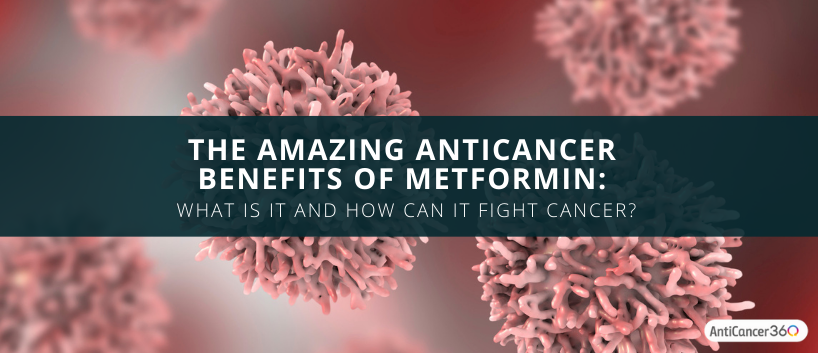When you’re fighting late stage or drug resistant cancer, it is important to look at all available options to enhance your current cancer treatment. You’ve probably heard about repurposing old household items for other uses… but did you know that older medications are being repurposed to boost the effects of chemotherapy or target cancer from an alternate approach? This is one of the options you may consider when trying to fight cancer from all angles.
Many medications that have been proven safe and effective may be used “off-label” to enhance treatment results. Off-label use is when a healthcare provider prescribes a medication for a reason other than its Food and Drug Administration (FDA)-approved uses [1].
Overall, there are many anticancer substances and strategies that can help you ”fight cancer from every direction.” Depending on your particular situation, using a repurposed medication off-label may help you fight cancer when added to your oncology treatments.
Today we are going to talk about the science behind metformin, a common diabetes medication, and how it has potential anticancer benefits. In some cases, metformin can be used off-label along with chemotherapy or radiation to overcome resistance and enhance treatment outcomes in a variety of ways [2]. Depending on your personal situation, this may give you a valuable advantage in your fight against cancer.
What is Metformin?
Metformin is a prescription drug [3]. It’s FDA-approved to treat type 2 diabetes in adults and children in combination with diet and exercise. If you have diabetes, metformin works differently than other diabetes medications to manage blood sugar levels without causing blood sugar to drop too low.
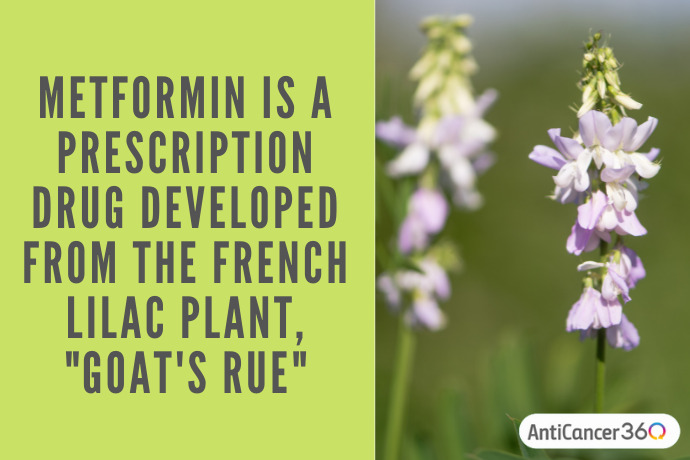
Like many other medications and supplements, nature provided the foundation for the discovery of metformin. The French lilac plant, “Goat’s Rue,” was found to lower blood sugar in grazing animals and lead to the development of metformin [4]. Metformin is most well-known for its ability to help lower blood sugar and keep it under control.
But most importantly for today’s post, many studies have shown that metformin has potential antitumor effects on several forms of cancer, and may possibly increase the effectiveness of certain cancer treatments [2].
How to Starve Cancer with Metformin: Cancer Metabolism Suppression
Cancer metabolism is how cancer cells break down nutrients to make energy. Cancer cells can use sugar, fats, and proteins to feed themselves. Blocking these nutrients from being processed can starve cancer cells and is an important cancer-fighting strategy.
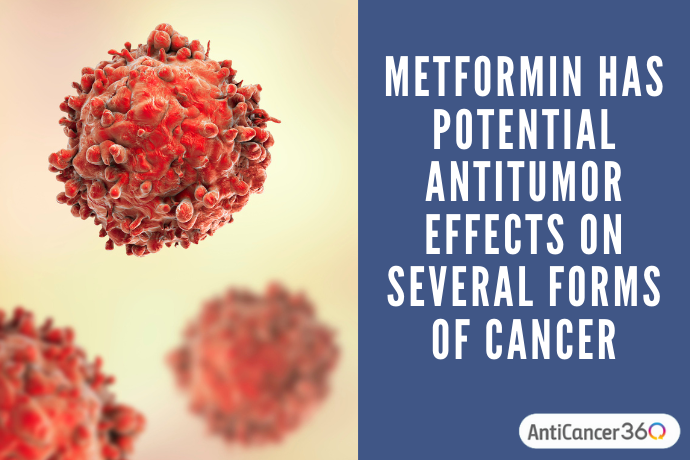
By starving cancer cells, we can slow cancer growth and make cancer treatments more effective. There are many natural substances and drugs that have the potential to block cancer metabolism. Even drugs approved for other conditions can be repurposed to enhance cancer treatments and starve cancer cells. Metformin, a common diabetes medication, is one of these drugs.
Metformin May Help To Starve The Cancer Of Sugar
Tumor cells usually have high energy needs and require a higher level of blood glucose (sugar) to meet those needs. Blocking cancer from using sugar to make energy can be an important strategy in your fight against cancer.
One way to starve cancer of sugar is to target glucose transporters such as GLUT1 to inhibit tumor growth [5],[6]. Cancer cells rely on glucose transporters to physically move sugar from the blood into cells, so they can use it as energy.
Overexpression of GLUT1, a glucose transporter in cells, has been seen in many cancers, including breast, lung, renal, colorectal and pancreatic cancer. GLUT1 is especially important for the transport of glucose into breast cancer cells [5].
But, research shows that metformin may decrease the available number of GLUT1s, reducing the amount of glucose that can move into the cancer cell [4]. So, decreasing glucose transport into cells is one way that metformin starves cancer cells of sugar.
Another way metformin starves cancer cells of sugar is by inhibiting “oxidative phosphorylation” (OXPHOS), a pathway that chemoresistant cancer cells rely on as a source of energy. (Chemoresistant cancer cells are cells that have stopped responding to chemotherapy.)
By inhibiting OXPHOS, metformin forces cancer cells to find a different energy source, making it harder for them to grow and spread. Cancer cells that mainly rely on OXPHOS for energy would be most susceptible to metformin due to their inability to use other metabolic pathways [7].

Studies in colon and breast cancer cells have found that the addition of metformin to chemotherapy agents reduces the ability of the cell to perform glycolysis (the breakdown of glucose), and may result in cancer cell death [8]. Metformin itself fuels glycolysis, limiting the amount of sugar available for cancer cells to use as energy.
In a study of metformin’s effects on human lymphoma cell lines, the drug significantly increased cancer cell death by alterating both glycolysis and OXPHOS. These alterations in metabolism could have a great impact in fighting Burkitt lymphoma, a rare, aggressive type of non-Hodgkin lymphoma, which appears to mainly rely on glycolysis and OXPHOS for energy metabolism [9].
The Pentose Phosphate Pathway is another pathway cancer cells use to break down glucose for their energy needs. Blocking the key enzymes in this pathway can decrease the growth and spread of cancer cells and help overcome chemoresistance. Preclinical and database studies in people with melanoma show that combination treatment with metformin can have the following effects:
- Increase cancer cell death
- Inhibit malignant progression in oral lesions
- Decrease tumor growth in human head and neck squamous cell carcinoma [10].
By blocking multiple pathways, metformin prevents the tumor cell from turning glucose into energy.
So, metformin may be a useful tool for starving cancer cells of glucose and enhancing the effect of other anti-cancer therapies.
In other words… metformin can help block sugar from nourishing the cancer cells, draining their energy, and may weaken the cancer overall.
Metformin May Block Cancer Metabolism of Glutamine
Cancer cells are continually adapting, and they need sources of energy to grow. So, if a cancer cell is starved of its energy from glucose, it can redirect to another metabolic pathway or to other stores of energy like glutamine and fat.
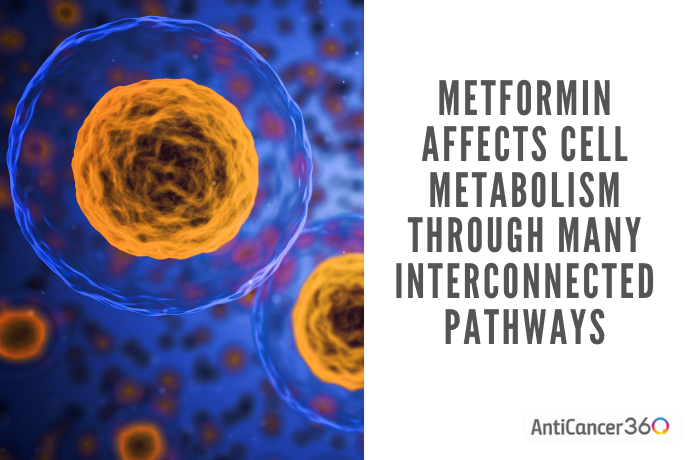
Cell metabolism involves many interconnected pathways, including IGF-1, mTOR and AMPK (and we’ll explain more about these soon). And all of these connections are in some way affected by metformin. Metformin increases the activation of AMPK, decreases circulating levels of IGF-1 and decreases IGF-1 induced activation of mTOR [11].
Metformin also works by lowering the level of insulin and insulin-like growth factor 1 (IGF-1) circulating in the body [12]. (To learn more about insulin’s effects on cancer, see this article about berberine.)
It’s thought that since metformin is an insulin-sensitizing agent (it makes the body more sensitive to insulin), its anticancer effects on IGF-1 are a result of the decreased release of insulin and insulin-sensitizing proteins in patients taking metformin. It was observed that decreased levels of insulin and IGF-1 blocked tumor growth and proliferation in studies of lung cancer models [13].
A study of women with endometrial cancer showed that high IGF-1 blood levels were reversed with standard doses of metformin. It was also found that the activation and suppression of mTOR was important in metformin’s effect in patients with endometrial cancer [14].
The enzyme mTOR (an abbreviation for “the mammalian target of rapamycin”) is part of a signaling pathway recognized as the principal regulator of cell growth and metabolism. It’s also a crucial link between the availability of nutrients in the environment and metabolic control [15].
Activation of the mTOR complex known as mTORC1 in cancer cells is associated with increased aerobic glycolysis, commonly known as the Warburg effect. Finding ways to inactivate this complex leads to decreased protein synthesis and glycolytic pathways. In other words, cancer cells would be less able to make proteins and use sugar if mTORC1 is targeted and inactivated.
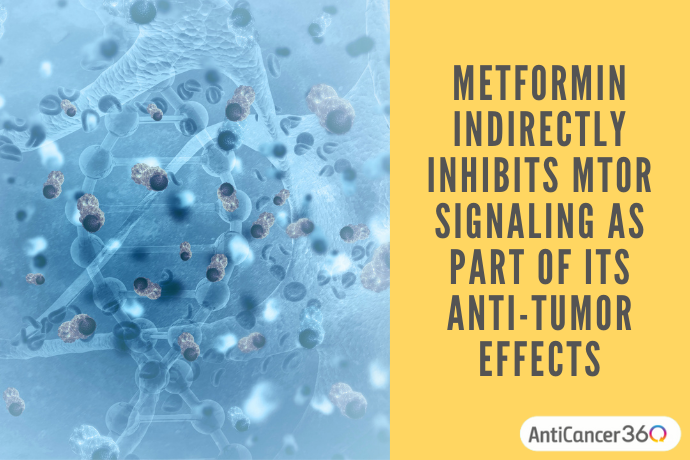
Studies have shown that metformin indirectly inhibits mTORC1 signaling as part of its anti-tumor effects. This action can reduce cancer cell proliferation, explaining the decreased progression of cancer cell growth observed in these studies [16]. Pancreatic cancer cell lines that show a significant increase in aerobic glycolysis may be particularly sensitive to metformin as part of an oncology treatment plan [17].
Overall, there’s evidence that metformin can starve a cancer cell of glutamine and protein, limiting its sources of energy to grow and spread.
Metformin Can Interrupt Cancer Metabolism of Fats
Metformin can also help starve cancer cells of fatty nutrients by interfering with the way cancer cells metabolize fats.
Fats (lipids, fatty acids, and cholesterol) are essential sources of energy for all cells in the human body. The metabolism of fats affects cell growth, proliferation, and survival.
Metformin indirectly reduces the amount of fats available for cancer cells to use as energy. It decreases the production of lipids and cholesterol through its effects on yet another metabolic pathway.
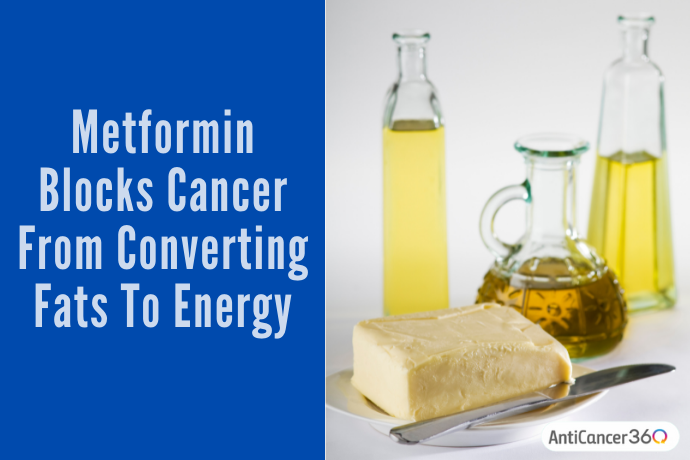
Sterol regulatory-element binding proteins (SREBPs) are involved in how fats are made and used in the body. There are three main SREBPs: SREBP-1a, SREBP-1c, and SREBP-2. Studies have shown evidence that SREBPs use multiple cell signals to control fat production and breakdown in type II diabetes and a variety of cancers [18]. By affecting these SREBPs, metformin can prevent cancer cells from obtaining the nutrients they need from fats.
Metformin is shown to block SREBP-1 which helps to limit the survival of prostate cancer cells [19]. It does this by blocking this metabolic pathway and starving certain cancer cells of nutrients from lipids and cholesterol. Metformin treatment was also found to downregulate SREBP-2 expression,and reduce its effects on lipid receptors [20].
In other words, metformin may starve cancer cells by reducing the available nutrients from fats, which results in cancer cell death.
Metformin as Part of the Aggressive Integrative Approach to Cancer Treatment
Synergistic Effects of Metformin on Cancer Stem Cells
Unfortunately, many cancer patients encounter failure to initial treatments, and some may have recurrence of previously responsive cancers. Resistance occurs when a cancer that had been previously responding to treatment suddenly begins to grow again.
The study of cancer stem cells is important in determining why some tumors become resistant to multiple drugs and exploring ways to overcome this resistance. Cancer stem cells are a small set of cancer cells that can self-renew and differentiate into various types of specialized cells They can also seed tumors when transplanted into an animal host to assist in studying potential treatment options.
A 2020 study of nondiabetic patients with advanced-stage epithelial ovarian cancer showed that treatment with metformin led to:
- A 2.4-fold decrease in specific cancer stem-like cells
- Increased sensitivity to cisplatin (a platinum-based chemotherapy drug)
- Decreased chemoresistance in cancer-associated stem cells [21]
This study showed that metformin was safely tolerated, and led to better-than-expected survival for these ovarian cancer patients.

Overall, it’s important to consider metformin as part of an integrative, complementary approach along with current traditional chemotherapy treatments, due to the impact of metformin in cancer stem cells.
Metformin May Boost the Cancer-Killing Effects of Chemotherapy
When dealing with late stage, resistant cancers, substances that can improve response to current chemotherapy medications become important and may be key to improving therapy outcomes. It may be possible to overcome treatment failure by repurposing or repositioning drugs traditionally used for other conditions to enhance chemotherapy regimens and natural medicines.
Metformin has been studied as a chemosensitizing agent in a wide range of clinical trials for various cancer cell types. Targeting metabolic pathways, metformin can alter tumor growth, invasion, metastasis, and response to therapies. Several metformin studies have already been performed, or are ongoing for cancers including ovarian cancer, fallopian tube cancer, primary peritoneal cancer; esophageal squamous cell carcinoma, prostate cancer, pancreatic cancer, breast cancer, glioblastoma, childhood ALL, endometrial cancer and diffuse large-B-cell lymphoma.
These studies have looked at the chemosensitizing ability of metformin with various chemotherapeutic agents such as docetaxel, carboplatin, paclitaxel, oxaliplatin, gemcitabine, vincristine, irinotecan, temozolomide, and cyclophosphamide. Metformin has also been found to improve sensitivity to hormone modulating drugs, immunotherapy drugs, antibiotics, and DNA-damaging targeted drugs. Metformin was found to enhance chemotherapy regimens and aid in conquering chemotherapy resistance in some types of cancer cells by reprogramming cancer cell metabolism [22],[23].
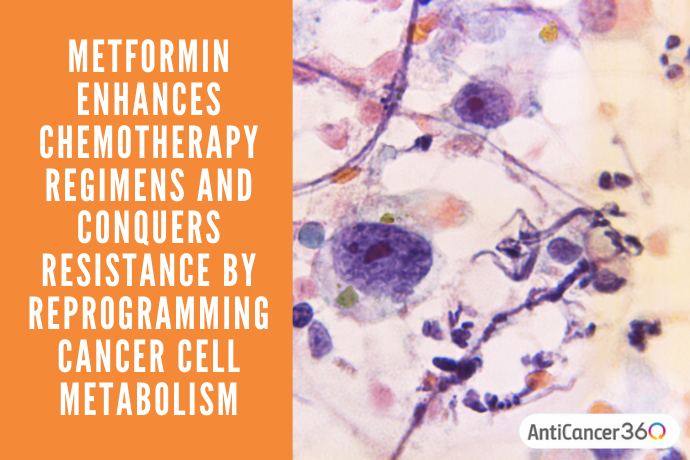
In a 2019 study of metastatic breast cancer models, mice treated with low-dose cyclophosphamide combined with metformin had better response, increased tumor death, and fewer lung metastases [24].
Metformin has also been found to have a chemosensitizing effect on cisplatin in various cell cancer lines. A study of meningioma (a type of brain cancer) cells suggested that metformin enhanced the chemotherapeutic effects of cisplatin when used as combination therapy. Combination treatment with cisplatin and metformin was found to significantly reduce meningioma tumor growth— with no increase in adverse effects— as compared to treatment with cisplatin alone [25].
Non-Hodgkin’s diffuse large B-cell lymphoma is another cancer in which treatment is limited by chemotherapeutic resistance. A 2018 study of cell, animal, and human database studies found that combination treatment with metformin and rituximab for lymphoma was associated with increased progression-free survival and overall survival [26].
Metformin May Strengthen the Effects of Radiation
Metformin has been found to enhance the effects of radiation on cancer cells.
In multiple research studies, metformin has been shown to have radiosensitizing effects. This means that metformin may improve the cancer-killing effects of radiation therapy in some forms of cancer, including lung and pancreatic cancers.
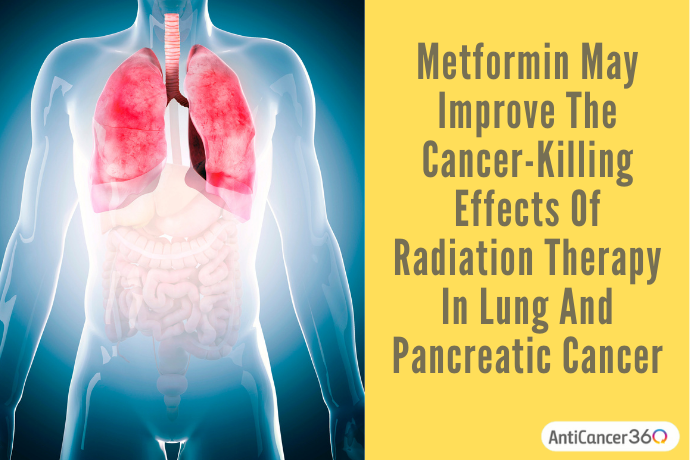
Cisplatin is a drug commonly used to treat non-small cell lung cancer. However, its use is limited by the development of resistance. A study of these cancer cells found that treatment with cisplatin combined with metformin prior to radiation treatment improved radiation outcomes [27].
Pancreatic cancer, another difficult and often radiation-resistant cancer, has been the focus of several studies involving metformin as a way to increase radiosensitivity. Several studies in pancreatic cancer cell lines suggest that metformin increases the sensitivity of cells to radiation therapy alone and when combined with gemcitabine, a chemotherapy drug [28].
How To Use Metformin: Dosages, Side Effects, and Precautions
Dosage
Metformin is available by prescription only. It comes as a tablet in doses of 500 mg, 850 mg, and 1,000 mg. Most studies of metformin for cancer used dosages ranging from 1,500–2,250 mg per day.
Metformin dosing is typically divided throughout the day with meals and ranges from once daily to three times a day. Dosages are usually started low and slowly increased to minimize digestive side effects such as diarrhea [3].
Side Effects
Metformin is generally considered safe and well-tolerated. The most commonly reported side effects are diarrhea, nausea, vomiting, flatulence, and indigestion. Less common side effects may include rash, hypoglycemia (low blood sugar level), sweating, and taste changes [3].
Interactions with Drugs and Supplements
Metformin has the potential to interact with other prescription drugs and natural supplements. There may be unknown drug interactions that could happen with metformin, especially in relation to chemotherapy and other cancer-related medications. This is by no means an all-inclusive list of potential interactions.
- Drugs that compete with metformin for elimination by the kidney. Some examples include:
-
- Morphine, amiloride, digoxin, procainamide, quinidine, quinine, triamterene, trimethoprim, vancomycin
- Drugs that may raise blood sugar levels, such as
- Corticosteroids, diuretics, thyroid medicines, estrogens, birth control pills, phenytoin, nicotinic acid, calcium channel blockers, isoniazid
It is important that you consult with your doctor or pharmacist before including any medications or supplements in your program. Please share your updated medication and supplement list with your healthcare provider whenever a new addition is being considered.
Metformin May Be A Powerful Weapon Against Cancer
Be sure to discuss the risk-versus-benefit potential with your healthcare provider before starting metformin, which is available by prescription only. They may prescribe metformin to you if they agree that this medication is safe and appropriate for you.
Overall, you can see that there can be many potential benefits to adding a repurposed drug like metformin to your anticancer program. When you are fighting cancer, you want every possible weapon in your arsenal.

Metformin, as well as several other medications and natural supplements, may help reduce side effects and enhance the results of oncology treatments, improving your chances of success. Depending on your unique situation, why not fight cancer from every possible angle, especially with difficult or advanced cancers?
Ultimately, when using an “Aggressive Integrative Approach” to cancer, the goal is to fight cancer from every possible direction. This approach includes examining repurposed medications and integrating the use of natural supplements to fight cancer based on available evidence, despite limited human data, and doing it in a way that won’t interfere with your oncology treatments.
How are you approaching your cancer treatments? Are you taking any natural or dietary supplements? Have you tried metformin? Have you made any other lifestyle changes that have made a noticeable difference in your fight against cancer? Please let us know in the comments below!
If you’d like to learn more about the AntiCancer360 approach and see if we can help you… please watch our free online webinar to learn more about our approach. Then at the end, you’ll be able to schedule a free call with someone from our team so that we can discuss your case in more detail.
Dr. Elizabeth Cambria is a 2004 graduate of the University of Pittsburgh School of Pharmacy. She has more than 20 years of clinical experience in community pharmacy and patient consultation. She is one of AntiCancer360’s consultant pharmacists and medical writers.
Elizabeth is passionate about patient education and believes knowledge is power in the pursuit of a healthier life. As both an ovarian cancer survivor and experienced pharmacist, she is dedicated to sharing her expert knowledge to educate patients and provide them with up-to-date advice. She believes in an integrative approach to preventative care and health management.
Elizabeth’s hobbies and interests include reading suspense novels, baking, and traveling. She hopes to one day accomplish her goal of visiting each and every state in the US. Elizabeth currently resides in Pennsylvania with her family, and their 3 rescued barn cats.

